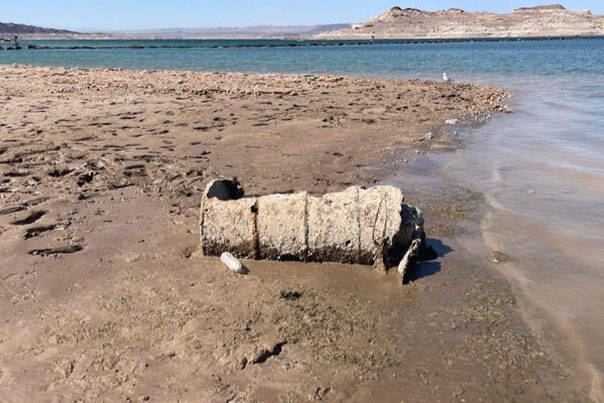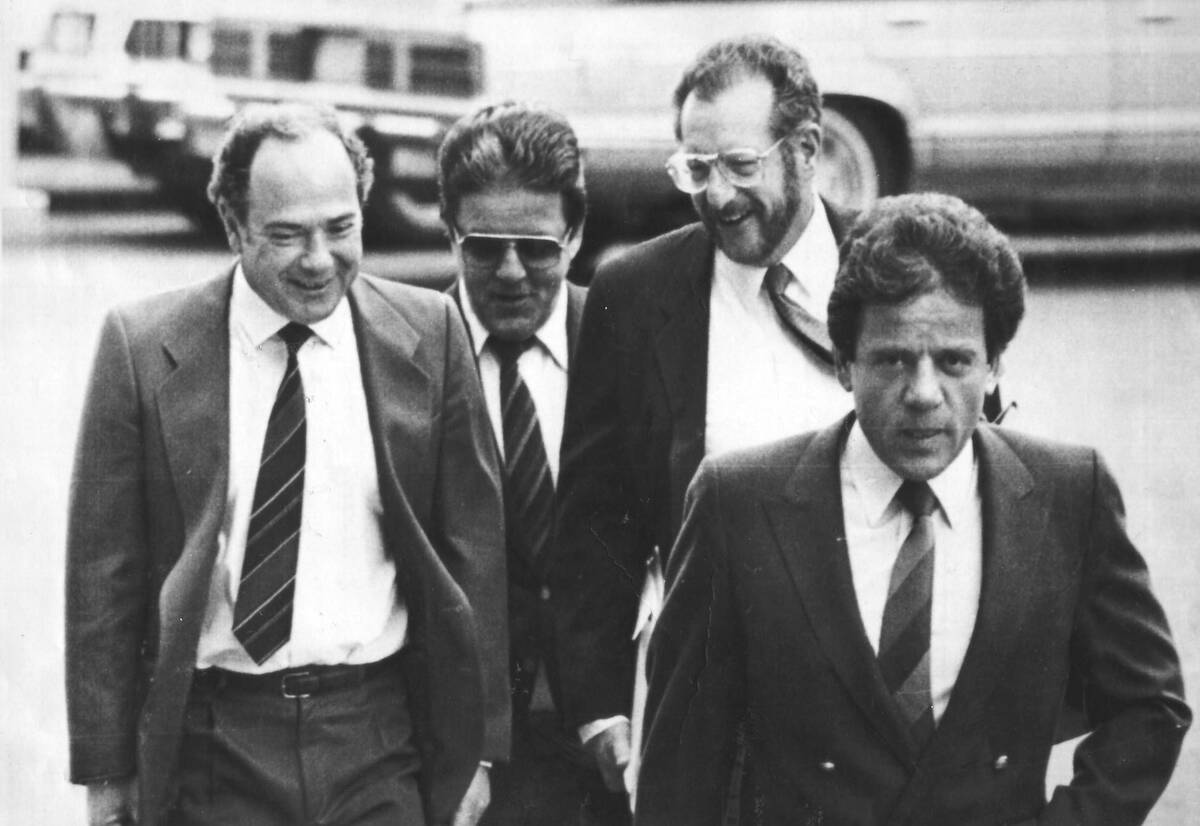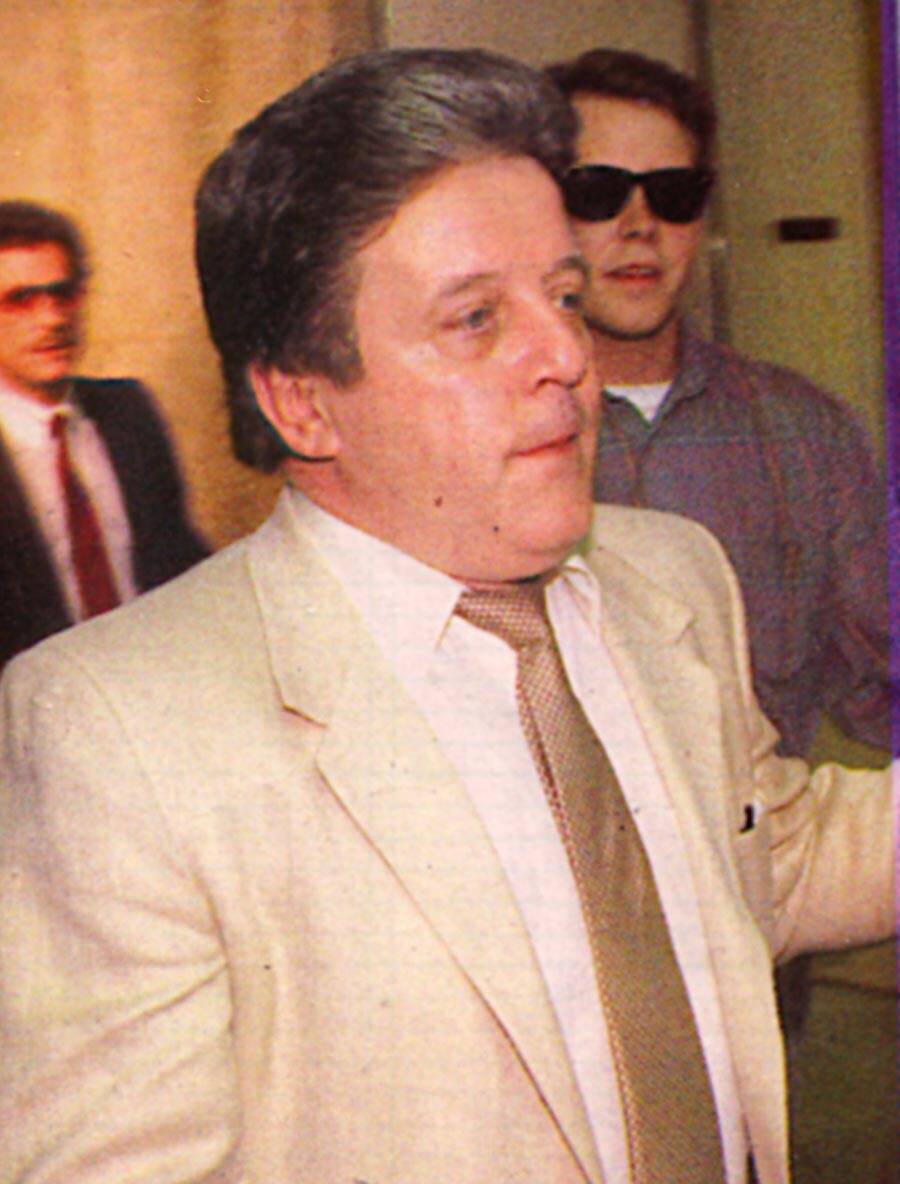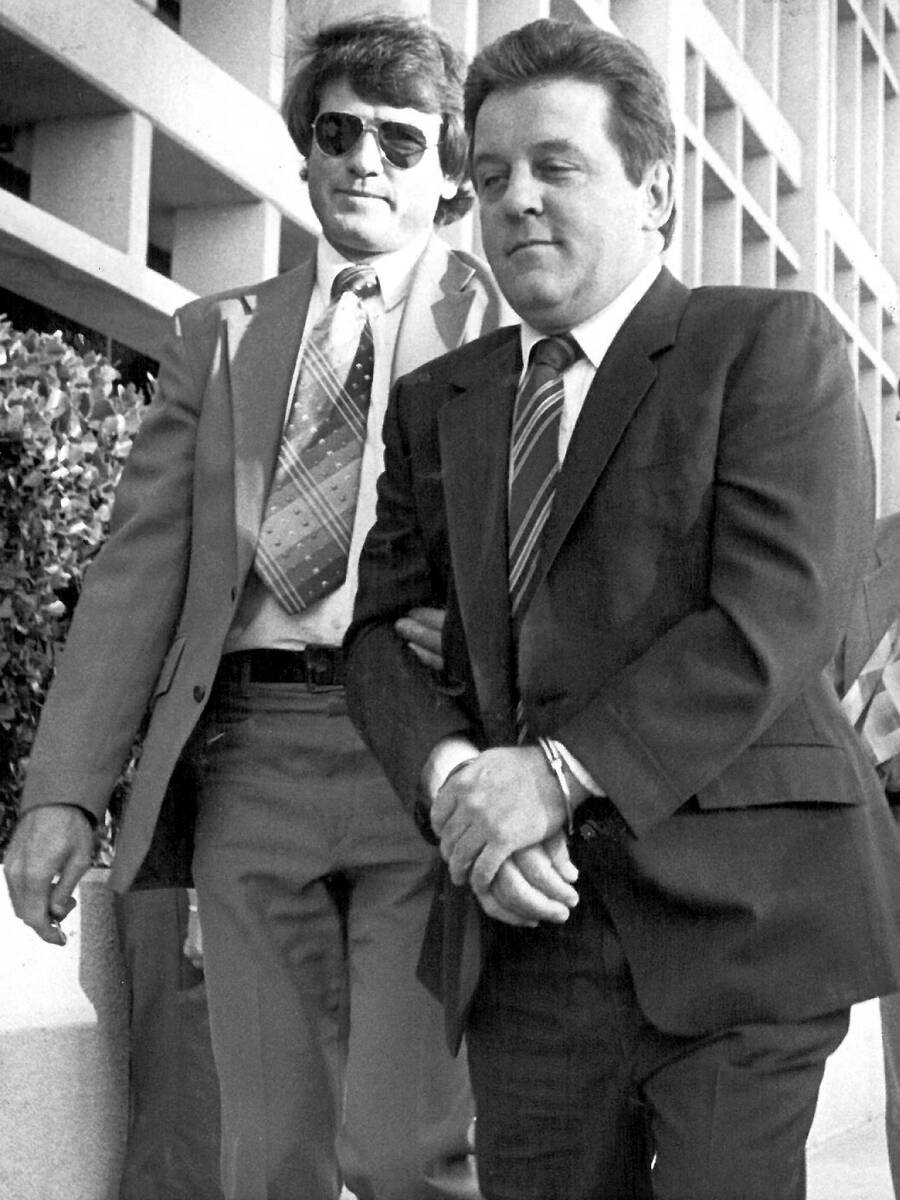Theory ties mobsters to body found in barrel
Editor’s note: This article first appeared at DailyMail.com
When mobsters bury their secrets, they expect them to stay hidden.
Usually, they’re right.
But as Nevada’s drought-ravaged Lake Mead recedes and sunlight shines on its muddy depths for the first time in decades, we may be getting a glimpse into the dark and sordid mob history of Las Vegas, which lies just 30 miles away.
On May 1, the remains of a decomposed human body stuffed inside a corroded metal barrel were discovered stuck in Lake Mead’s mud.
The killers transported the barrel by boat several hundred yards out into the lake and dumped it in what was then 100 feet of water.
There it sat at the bottom of the lake — until now.
Already the dead man is talking — giving us clues of who he may have been, why he was killed and by whom.
Detectives confirmed that the corpse still had a shirt, belt and shoes clinging to the remains.
They determined the clothing was purchased in the mid- to late 1970s at a Kmart discount store — far from the choice attire of a high-rolling, fashion-conscious mobster.
The timing suggests the killing occurred between the 1970s and the early 1980s, coinciding with the most violent period in Las Vegas’ past — an era of unprecedented street crime and underworld killings.
Our research has found three possible victims who may be the body in the barrel.
The three men, each with links to the mob, disappeared at that time and their bodies were never found.
Most speculation has centered on George “Jay” Vandermark, a gambling machine cheater trusted by the mob to oversee its slot machine operation at the Stardust casino on the Las Vegas Strip — that is, before he double-crossed them.
The mob wanted him dead, but we doubt that it is him in Lake Mead.
There’s William Crespo, a drug-runner who turned state’s evidence after he got busted smuggling cocaine. He was set to testify against a former insider from a mob-controlled casino company but never made it to trial.
And our leading candidate for the man in the barrel is Johnny Pappas, a Chicago native and veteran Las Vegas casino host.
We can reasonably — by virtue of his owning a boat at Lake Mead — place him at the scene of the dumping grounds around the time the murder may have occurred.
The thread that strings these three men together is they were all linked to the most powerful Las Vegas mob operation of that time — Argent Corp., a front company for an organized crime operation that ran some of Las Vegas’ top gambling operations.
And if that theory holds, it may also lead us to a likely killer. One of the most notorious enforcers in mob history, Tony Spilotro.
This ruthless murderer was brought back to life as the fictional Nicky Santoro, played by Joe Pesci, in the 1995 mob movie classic, “Casino.”
Spilotro was considered a suspect — as perpetrator or director — in almost 20 mob-related murders and disappearances from 1975 to 1977.
His weapon of choice was a .22-caliber pistol, equipped with a suppressor, and fired into the victim’s head.
Argent Corp. and Las Vegas bloodbath
Since the mob’s arrival in Las Vegas in the 1940s, the city was regarded by America’s crime bosses as an “open city,” a place where crime families agreed not to fight over turf, as they often did in cities such as New York and Chicago.
The idea was that organized crime could share in an overflowing fountain of cash pouring from legitimate gambling operations.
By the 1970s, the Chicago Outfit, an organized crime syndicate based in Illinois that dated back to the days of Al Capone in the 1920s, established a major presence in the city after consolidating power for decades.
Argent Corp. had become a major player in Las Vegas — owning the Stardust, Hacienda and Marina hotel-casinos on the Strip, and the Fremont downtown.
Frank “Lefty” Rosenthal, portrayed as Sam “Ace” Rothstein by Robert De Niro in “Casino,” was hired to run the Stardust — the crown jewel in Argent’s criminal empire.
The mob stole (or skimmed) a percentage of those revenues and delivered them to crime bosses in Chicago, Kansas City, Milwaukee and Cleveland.
“Skimming” works by hiding legitimate revenue from the federal government and thereby avoiding taxes.
But the mob’s relative free rein in Las Vegas began to erode as state and federal law enforcement stepped up its scrutiny of casinos.
Corporate purchases of Strip resorts drove out many older crime figures with hidden holdings. With the mob losing its influence, petty crooks and low-life hustlers who once feared the wrath of mobsters moved to town and even entered the casinos to operate.
The result was a wave of crime perpetrated by loan sharks, burglars, arsonists, gaming cheats, unlicensed bookmakers, shakedown artists, pimps, streetwalkers and drug dealers.
The mob, ignoring the conventional wisdom to avoid murdering people in the “open city,” reacted violently and victims started disappearing without a trace.
In 1974, the Los Angeles Times report that between 1971 and 1974, Las Vegas saw more gangland slayings than in the previous 25 years combined.
Vandermark, the slot machine cheat
When news about the body in the barrel at Lake Mead broke, the first name to come to mind for many longtime Las Vegans was George “Jay” Vandermark, who vanished in 1976 while being pursued by the Outfit.
Vandermark was hired by “Lefty” Rosenthal in 1974 to oversee the slot machines at the Stardust and the other three Argent-controlled casinos, but he was really there to run their skimming operation.
Vandermark facilitated the skimming of between $7 million and $15 million worth of coins from the slot machines. But the Nevada Gaming Control Board found out about the operation in 1976.
Nevada gaming regulators subpoenaed Vandermark as a witness to the crime and he fled to Mazatlan, Mexico. He was rumored to have ended up in Costa Rica.
It got worse for Vandermark because the Outfit suspected him of only giving them $4 million from the skimming operation and pocketing $3 million for himself.
For a while, Vandermark’s son, Jeff, who was working with the gaming board, communicated with his father, whom he said might be willing to return to testify.
But Vandermark was last seen at a Phoenix hotel in September 1976. He never made it to trial.
In “Casino,” the character John Nance, loosely based on Vandermark, is hiding out in Costa Rica, where he is located and shot dead by a mob hitman armed with a .22-caliber pistol.
However, based on federal court testimony, Outfit hitman-turned-witness Nick Calabrese claimed to have cleared up the mystery surrounding Vandermark.
Calabrese said the Outfit learned that Vandermark was hiding out at a luxury hotel in Phoenix, the Arizona Manor, owned by Outfit associate Emil Vaci.
They sent hitmen John Fecarotta and Jimmy LaPietra to meet up and kill Vandermark. The pair buried his body in the Arizona desert, Calabrese said.
Vandermark’s body has never been found.
In April, 1977, his son Jeff was found murdered at his Las Vegas apartment. Las Vegas police investigated, arrested a suspect and concluded with certainty that the motive was robbery and not tied to his father’s activities.
Crespo, the drug-runner turned rat
William Crespo was a former resident of Puerto Rico, who was arrested by federal agents in Las Vegas in 1982 after he was caught flying in from Miami with $400,000 worth of cocaine.
Many details about this man have been lost to history, but it is possible he had some valuable knowledge about the Argent skimming case.
Given the evidence against him, Crespo accepted an offer of immunity to become a federal informant and protected witness to testify about the multimillion-dollar drug ring with which he was involved.
The U.S. government spent $13,000 for his relocation and living expenses. And his testimony before a federal grand jury helped lead to the indictment of 10 defendants, including Victor Greger, a former Argent executive.
Then Crespo, set to appear at trial, vanished in June 1983.
With Crespo a no-show, the federal judge had no choice but to drop the charges against seven defendants, who pleaded not guilty.
Pappas, the Lake Mead boat owner
Johnny Pappas is the leading candidate for the barrel murder victim, due to several key factors, as reported recently by longtime Las Vegas journalist John L. Smith, who knew him as a child.
“Johnny Pappas, born Panagiotakos if I remember correctly, found employment in the casino industry at the Castaways, Las Vegas Hilton and Caesars Palace,” Smith wrote for the Nevada Independent. “By the mid-1970s, Pappas was managing Lake Mead’s Echo Bay Resort, a Teamsters Central States Pension Fund-financed project, for the Argent Corporation.”
Echo Bay Resort, now closed, was a hotel and boat launch.
Pappas also owned a boat docked at Lake Mead.
On Aug. 18, 1976, the day he disappeared, Pappas told his wife he was going to Jojo’s restaurant at 1531 Las Vegas Blvd. South, near downtown Las Vegas, to meet someone interested in buying his boat.
Four days later, his car was spotted in the parking lot of the Circus Circus casino on the Strip.
Police, who confirmed Pappas had underworld connections, investigated his disappearance but found no trace of him.
Did the Outfit fear that Pappas might have something to reveal about the then-unfolding details about skimming at the Argent casinos? If so, they had a motive to rub him out.
It wouldn’t be much of a stretch to speculate that they may have lured him to his death by setting up the ruse of a potential buyer of his boat.
After he was theoretically killed and shoved into a barrel, it wouldn’t have taken much to dump his body, perhaps using his own vessel.
Spilotro, the mob enforcer
If the victim in the barrel was Pappas, Crespo or even Vandermark, then the director of the Lake Mead murder might well have been Tony Spilotro.
The Outfit sent him to Las Vegas in 1971 to watch its secret casino interests. He soon expanded into street rackets with his gang of burglars, bookmakers, jewelry fencers and hitmen.
In the mid-’70s, Spilotro worked behind the scenes to ensure that the millions in cash siphoned from Las Vegas casinos made its way to crime families in Chicago, Kansas City, Milwaukee and Cleveland.
And suspected mob hits were happening across the country at that time. In 1977, FBI agents from Las Vegas, Los Angeles, Chicago, Detroit and New York gathered in San Diego to discuss a baffling rash of nearly two dozen alleged contract murders nationwide.
Each of the victims died from a shared method — one or more nearly point-blank shots to the head from a .22 handgun, a favored implement of hitmen because the slugs enter the skull without blowing back blood and brain matter.
Arrested time after time, and sometimes brought to trial, Spilotro was never convicted of a homicide.
But his Outfit colleagues, tired of Spilotro’s high profile and constant legal troubles, beat him and his brother Michael to death in suburban Chicago in 1986.
They buried the brothers, sans barrels, in an Indiana cornfield.
The Clark County coroner’s office estimates it could take as long as a year to identify the body in the barrel. The investigation will include the examination of familial DNA. In the meantime, we will continue our research to solve this mystery.
Jeff Burbank is a content development specialist at the Mob Museum in Las Vegas. He is the author of “Las Vegas Babylon: True Tales of Glitter, Glamour, and Greed.” Geoff Schumacher is the museum’s vice president of exhibits and programs and the author of “Sun, Sin & Suburbia: The History of Modern Las Vegas.” Burbank and Schumacher are former Review-Journal employees.



















